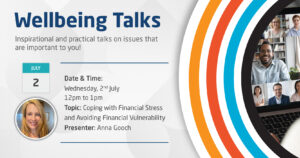News
Spotting the signs of struggling – checking in with yourself
Mental health is such an important and complex part of our overall well-being. It involves our emotional, psychological, and social well-being and affects how we think, feel, and act. Mental health influences how we handle stress, relate to others, and make decisions. It’s something we all have, just like physical health, and it can be nurtured, maintained, or challenged throughout our lives.
Mental health struggles are common, but many still feel shame or fear about reaching out for help.
Noticing the signs that you might be struggling with your mental health is an important step toward getting support. These signs can show up in different ways—emotionally, physically, or through your behaviour.
Life can often get busy, and there are times we miss the signs our body and mind are giving. To help with this process the EIC have listed below behaviours that may be signs you are stressed or struggling. If you identify any of these in your daily routine – you know to take a moment to pause, be kind to yourself and think of ways to get support.
- Feeling overwhelmed, tearful, irritable, or angry for no clear reason
- Being withdrawn, not participating in conversations or social activities
- Increased consumption of caffeine, alcohol, cigarettes or substances
- Trouble concentrating, remembering things, or making decisions
- Feeling like your mind is “racing” or stuck in worry loops
- Erratic or socially unacceptable behaviour
- Being louder or more exuberant than usual
- Loss of confidence
- Presenteeism
- Frequent headaches, stomachaches, or unexplained pains
- Difficulty sleeping or ongoing fatigue
- Neglecting responsibilities, hygiene, or appearance
- Sudden weight loss or gain
Please note, this list is not exhaustive and it’s crucial to remember that everyone will experience struggling differently, and for different reasons. If notice any of these signs, especially over an extended period, or anything out of character about yourself, or those around you, it could be a sign that support would be beneficial.
Please do not hesitate to reach out for assistance.
Responding to my needs and reaching out for support
If you have identified that you are struggling, what can you do to help yourself?
While not a replacement for professional help, the idea of self-care is a way of checking in with yourself and can also assist in easing the load. Some examples include:
- Journaling your thoughts and emotions
- Getting fresh air or short walks
- Limiting news and social media when it feels overwhelming
- Reaching out to someone regularly, even if it’s just for a quick check-in
If you are experiencing persistent symptoms and need further intervention, you can reach out to the EIC for support. Please note, the EIC is not a crisis response team, the help you require may be beyond our remit.
Remember in an emergency to call 999 directly. If you are experiencing suicidal ideation but are not in crisis, the first step would be to contact your GP and request support from your local crisis team of community mental health team. Numbers for your local crisis team can be found by calling 111 and requesting the number. You may also need to attend your local A&E and request to speak with the duty psychiatrist.


